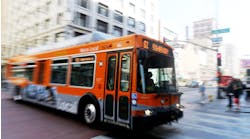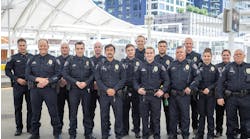Keeping America’s mass transit and passenger rail systems, as well as the American Public, safe is no easy task, but it is an important one. To help measure where we are as a nation, the Transportation Security Administration (TSA) uses the Baseline Assessment and Security Enhancement (BASE) program to assess individual transit agency’s security programs.
“To start off with the BASE Program measures how a mass transit property or a passenger rail property is doing in 17 key areas of security. The areas range from things like employee training, drills and exercises, vulnerability assessment, all the public awareness campaigns, all the way to things like do you have an audit program, do you have a security information management program,” explains Doyle Raines, director of the TSA’s Surface Division.
Raines says that after gathering the information from assessments, TSA looks at the information both vertically and horizontally.
“For example if I saw there was a national trend where they weren’t getting the front line employee training done, then I could work on finding resources and trying to improve the nations employee training for transit. So that’s what I mean be a vertical,” he says.
An example of how he would look at it horizontally is if an agency is having challenges meeting the 17 measures the BASE program looks at, TSA can arrange to get the appropriate people out to the agency to help them meet their goals.
“We really want to position our agencies, our transit community for success. So that’s why we have the BASE Program,” Raines says. “It’s just really a score card for how we’re doing as a country in transit security.”
The BASE Program began about five years ago, with Bay Area Rapid Transit being the first agency to pilot the program. Today, there are about 100 agencies TSA is focusing on with the BASE Program, Raines says. BASE is a voluntary program and is not required by TSA.
“It really takes a faire amount of organizational confidence to invite somebody to come in and take a hard look at your security programs. And we’re very proud of the fact that the transit community has really gone the extra mile and opened up their doors to let us come in and take a good look at them so we can know how we are doing as a nation on mass transit security,” comments Raines.
While Raines could not provide exact specifics on what TSA looks at because of security sensitivity, he said that one of the main things they start off with is looking at an agency’s security plan. “The security plan is the road map for how that agency’s going to do,” he says.
Some areas BASE looks at includes whether or not an agency has conducted a vulnerability assessment of its key stations and critical infrastructure. Raines says they will also look at an agency’s record to see how they are doing on training and what the results of their last set of drills were.
“Really, it works in two ways,” Raines says, “There’s the sitting at a desk and looking at where they think they are and their plans, and then it’s about getting out and getting into the properties and looking at their vulnerabilities and seeing how they’re planning to address them.”
How to Participate
Agencies that are not already part of the BASE Program should contact their transportation security inspector at their local airport, Raines says. While TSA is placing the majority of their focus on major systems that they believe are most at risk, they are happy and willing to help agencies of any size, Raines stresses. “We’ve yet to turn anybody down. We may ask for people to be a little bit patient with us from time to time, but we haven’t had to turn anybody down yet,” he says.
Raines says there is always a benefit to having someone from the outside come in and look at your program, regardless of your industry or profession. “When it’s something critical to our nation’s health and well being like mass transit security, it’s really important for us to get in there,” he says.
Raines continues: “The other thing that happens, which I think is the biggest benefit, is that we learn things from our inspections. There are best practices throughout the country that we get from these various inspections, assessments really. Then we compile those and send them out to the transit community so that they can learn…Our transit agencies are extremely well run, well managed business and they know how to innovate and wherever we can find an innovation we try to share it.”
For agency’s that are excelling, those that receive the Gold Standard, TSA won’t come back to do another inspection for three years. However, in the interim they will have regular contact with the agency and will make visits out to the property; they just won’t perform an official audit.
“It’s not like we will never be on that property for three years; we still go back and collaborate and cooperate and share information, but the actual formal BASE assessment will be every three years if you are meeting that absolute superior standard that these 17 properties have met,” explains Raines.
For agencies that are doing “a pretty good job,” then TSA will come every other year to perform an assessment. Finally for those agencies who have areas that need work, TSA will work with them and perform an assessment every year.
“If you’ve got things that we’ve got to work out together, then we’re going to hang in there with you and assess you every year until you’re in good shape and we’re going to be working with you on a regular basis. A lot of times especially in the smaller properties it’s good for them to have a little help,” Raines says.
Security Improvements
The BASE Program has helped to raise the overall security baseline of the country.
“What we saw three years and what we’re seeing now, we’re seeing a definite improvement in the security baseline of the country. I think we’re going to be raising the bar and will continue to raise the bar so we are delivering excellence in security,” Raines says
This year TSA handed out 17 awards for the Gold Standard The recognized agencies were reviewed in 2011 and attained high scores across all categories. TSA considers this caliber of performance as reaching a “Gold Standard” and recognizes these agencies for having strong security programs. TSA continues to work with all transit agencies across the country to develop and implement robust security practices system-wide.
The agencies recognized for achieving the Gold Standard in 2011 are: Amtrak, Bi-State Development Agency (MetroLink) in St. Louis, Central Ohio Transit Authority, Denver Regional Transportation District, Greater Cleveland Regional Transit Authority, Hillsborough Area Regional Transit Authority, Indianapolis and Marion County Public Transportation, New Orleans Regional Transit Authority, North County Transit District, Pierce County Transportation Benefit Area Authority, Pinellas Suncoast Transit Authority, Pioneer Valley Transit Authority, Regional Transportation Commission of Southern Nevada, Rhode Island Public Transit Authority, Southeastern Pennsylvania Transportation Authority, Spokane Transit Authority and Washington Metropolitan Area Transit Authority.
Of those 17 awards, five of them were personally presented by the TSA administrator. “I think that really shows the importance of the program to TSA. He would have done more if his schedule would have allowed it. I think it’s just a really important program for us and it’s nice to be able to go out and recognize excellence,” Raines concludes.


